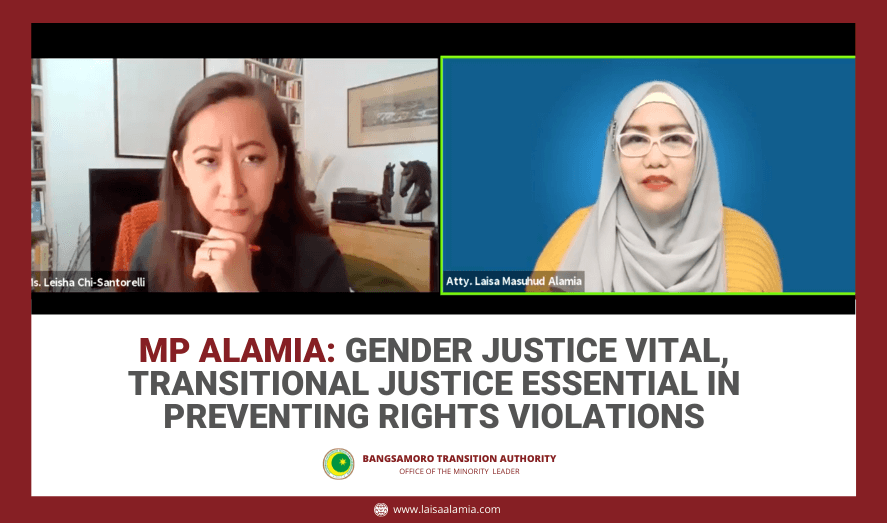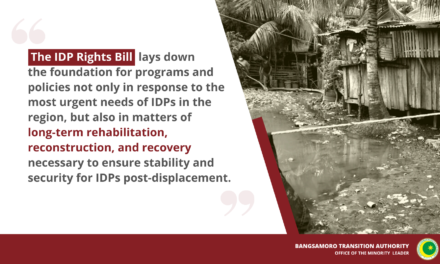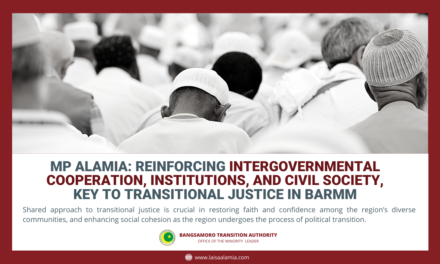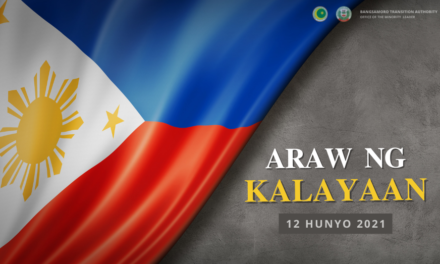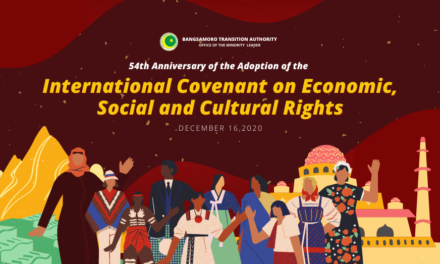“The commitment to expanding women and girls’ access to justice should be anchored on recognition of their needs,” Minority Floor Leader Atty. Laisa Alamia said in a webinar hosted by the International Development Law Organization (IDLO) focusing on the gender justice gap worldwide.
The event was held in partnership with UN Women, the World Bank and the Pathfinders for Peaceful, Just and Inclusive Societies in support of the Generation Equality Forum, Paris, France.
MP Alamia, together with six other women advocates for gender justice, discussed challenges, priority actions, and collaborative solutions, as they looked into shared gender justice gaps that exist around the world, especially those that have been exacerbated by the pandemic.
The global panel was moderated by Dr. Ilaria Bottigliero who serves as the director of Policy, Research and Learning at IDLO, and Leisha Chi-Santorelli who serves as world editor and senior journalist team manager of the BBC World Service.
Political transition in a post-conflict context
“We come from a post-conflict area,” MP Alamia said as she explained the nature of the Bangsamoro region’s political transition while “incorporating international treaties and national laws” into its structure. She pointed out the need to focus on carrying out transitional justice, especially in post-conflict societies.
In mapping out challenges and solutions, she said that “we have to remember a lot of war-torn states are disproportionately affected by Covid-19,” and that “we tend to forget the needs of human rights victims, especially women and girls.”
“I believe it is vital to expand access to justice,” MP Alamia stressed. “Transitional justice response to conflict and authoritarian rule is essential in preventing future violations,” she noted, as she pointed out the importance of “a gendered analysis of justice and rethinking violations for which justice is sought.”
“Redress should not simply be limited to violative acts, but should also accommodate and address the inequalities that enabled these violations,” she said.
One of the few
When asked about her experience as one of the few women parliamentarians in the world, what your experience has been, MP Alamia describes the process of exclusion and marginalization that she has experienced not only as a member of the parliament but as a public servant in general.
“A little more than half of the total population in the region is female but, within our very own parliament representing the people of the Bangsamoro, only 13 out of 80 seats are held by women — just one woman for every five men in the parliament,” she noted. “Being one of these women members is not easy and, even in my time as the only female executive secretary of the former autonomous region, I have experienced exclusion to the point that sometimes women like me have to raise our voices a little just so that we can be heard.”
Alamia was quick to point out the need for allyship among men towards women. “Men’s involvement should also include meaningful reforms in our formal and informal institutions,” she said.
“Women have so often found themselves at the periphery of policy as our concerns have been described as ‘too narrow or too specific’ to our sector,” she shared, “and our needs have been subjected to incongruent standards.”
Opening up civic spaces
Alamia also tackled the importance of opening up civic spaces towards gender justice, not only for women but also for other sectors.
“We are working to legislate a women’s caucus,” she said in reference to current initiatives in the Bangsamoro parliament in recognizing the important role that women have in decision making and determining policies of regional government. “We are also putting forth the passage of the Gender and Development Code, and the Regional Action Plan on Women, Peace and Security.”
MP Alamia is the principal author of the proposed legislation regarding the establishment of a women’s caucus in the Bangsamoro Parliament.
When asked about the disproportionate violence that women receive online, MP Alamia said that while it was “often misunderstood as inevitable,” the past few years have exposed the “gendered and racialized nature of the attacks” as women are disproportionately subjected to online hate and vitriol, “especially when they come from racial and religious minorities.”
“While we must hold governments accountable,” she said, “we must also ask social media platforms to advance broader regulatory measures and be more transparent in terms of oversight.” She also emphasized the need for governments to take action “beyond passing platform regulations” by “promoting responsible digital citizenship in school curricula” and “helping promote more respectful ways of communication online.”

